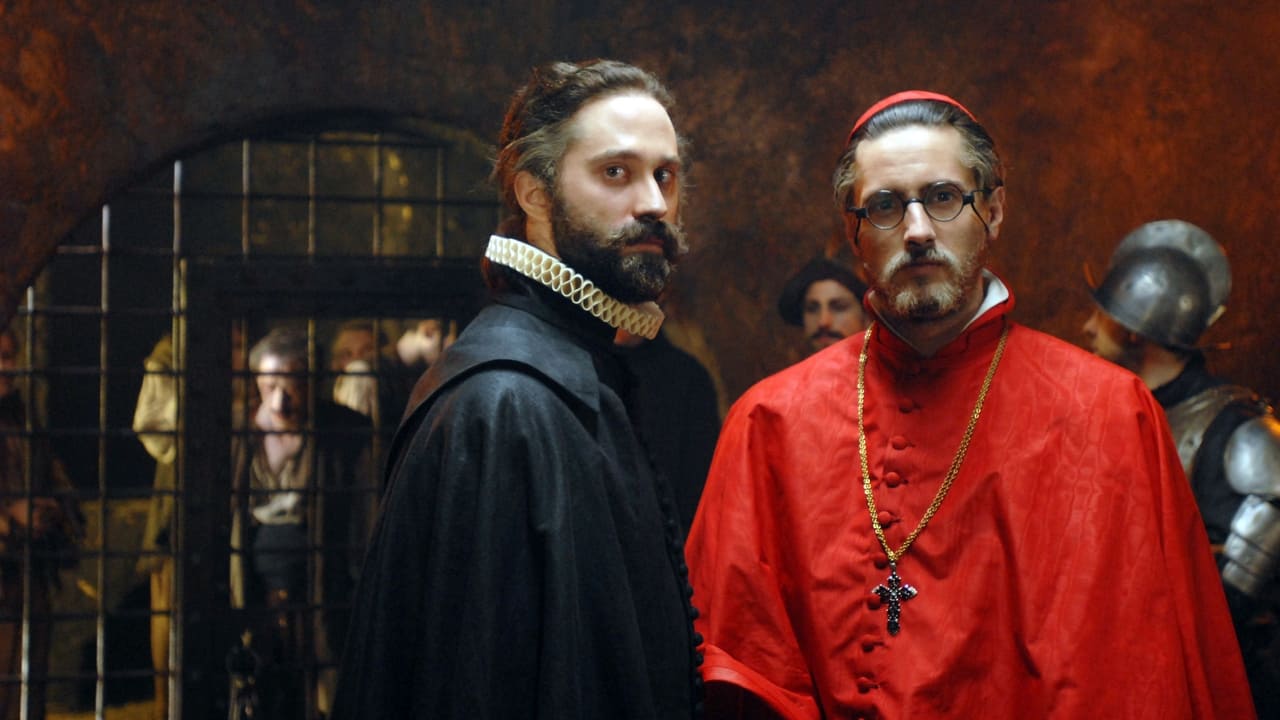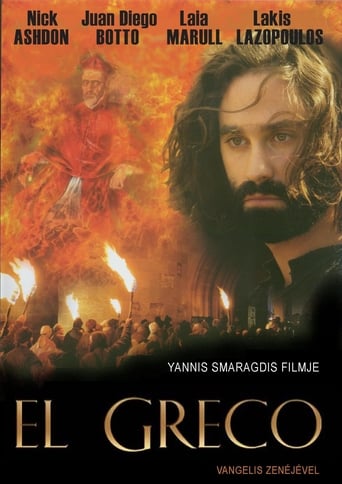

Very interesting film. Was caught on the premise when seeing the trailer but unsure as to what the outcome would be for the showing. As it turns out, it was a very good film.
... View MoreI gave this film a 9 out of 10, because it was exactly what I expected it to be.
... View MoreThe film makes a home in your brain and the only cure is to see it again.
... View MoreIt's a good bad... and worth a popcorn matinée. While it's easy to lament what could have been...
... View MoreThis was a big thing when it came out, fellow Greek readers will attest to that. It was aggressively promoted as both 'expensive' and 'prestigious', it seems a rare thing for Greek cinema. The story went that the filmmaker had to mortgage his own house to finance his vision, proof of bold artistic merit. The movie played theatrically for what seemed like endless months - to make back its partly government-subsidized budget the rumor goes, since little interest materialized abroad. Schools planned 'educational' trips to the cinema, probably for the same reason.How small it seems now. You can see loftier production values on TV, and probably much better acting and a less grating parade of profundities.What really offends though is the spirit behind the work. It's not that it is dull and completely without insight about its own craft. It is both these things, but that's a simple incompetence. I mean, here is a film about a man of extraordinary vision who wanted to paint with light, and the 'inspirational' film about him is wholly ordinary, as lush and spiritual as perfume. What poor use of Aris Stavrou, who once liked to puzzle (next to Nikos Nikolaidis) about texture and light.It's that Smaragdis hoped to capture a bit of Greek soul (not necessarily historical 'truth') and journey with it abroad, a noble aim. Capture us as we dream ourselves to be, feisty and passionate Zorbas, made pensive by centuries of hardship - a bit like Kusturica did for the neighboring Yugoslavs.The film is set in those centuries of foreign rule, Italian and Ottoman elsewhere. There was no Rennaisance allowed in those times, it would be good to note, no lofty national art as they could develop in the salons of Western Europe. Our painting was religious. Our theater was song and dance, from Thrace to Crete. The collective soul had to pour that way, which is why they still persist and resonate so strongly in these parts - as elsewhere in the former empire.You will know it's all phony by watching the scene of proud Cretans dancing after a skirmish with the Italians. You'd think, if there was a bit of ancient Greek song rising from the earth, it would be in that scene. If you are ever in the region, go to a Cretan wedding or folk fest, in fact anywhere in rural Greece during times of celebration. Then watch the posturing in the film. Dismal.If you want to know a bit about these things, to see actual Balkan spirit, seek out a man called Sergei Parajanov. He was Armenian who made films under Soviet rule, but it is the same soul he captured.
... View MoreThe screenplay is at times good, the sets and costumes passable, the story is good and nearer to the truth than most biopics -it even attempts to wove social and philosophical themes into the life of a gifted artist and his relationship with the man who admired him but could not become him.But, the photography is standard fare -as if it were made for television. The cinematographer fails miserably to grasp the opportunity afforded by telling the life of a painter in authoring with light and shadow and colors. It seems they did nothing but use textbook light and print what was in the camera without any of the care that makes Spielberg's cinematographers worth applauding.The direction is honest but it falls into the trap of directing actors in what to do and how to do it, instead of allowing them to breathe their own life into the film, for themselves. The actors, most of the time are the slaves of the cinematographer as puppets in ever-changing dramatic photographs.Nick Ashdon portrayed the main character as well as he was allowed by a limp and insecure director -unfortunately watching Nick Ashdon as El Greco was an exercise in trying to remember that I was not watching Joseph Fiennes in Shakespeare in Love.Juan Diego Botto as Niño de Guevara must have, in rehearsals, given director Smaragdis an expression from a certain camera angle that the director liked a lot, so he must have asked Botto to keep repeating it throughout the movie.There are some really bizarre moments of editing that make you wonder whether the director was interfering in the editor's work without the skill to do so, or whether the editor sneaked-in a few cuts that the director missed before the release. Then again they might have both been trying to make a dramatic statement but the efforts bore no fruit.This film is a genuinely honest effort by a genuine Greek director and crew to make a labor of love in telling the story and the soul of a great man. I urge you to watch it with this in mind. Because otherwise you will watch a film where the director, despite his passion, just didn't have what it takes.
... View MoreFirst of all, I don't think it is at all a DVD movie but an enjoyable film to watch at the cinema. The aesthetic of the film captures the audience's attention throughout the film. I personally think that the photography is excellent in the film as well as the direction. It tends to be a bit slow and without a lot of action but the audience understands that the film is not about action as it is an artistic and cultural film that tries (successfully) to bring out the souls of the characters to touch the audience. I agree that Dimitra Matsouka's performance was not strong enough but the performance's of Nick Ashdon, Laia Marull and especially Juan Diego Botto are well appreciated. The scenery and costumes are an accurate capture of the time period and beautiful to watch on screen. The plot is original as there are certain twists that one would not expect (for example El Greco's relationship with women)and the music is exceptional. The film is generally a great attempt on showing the potential quality of the Greek film industry throughout Europe. I think that there must be a good reason for 'El Greco' already winning 8 awards including best director in the Thessaloniki film festival!!
... View MoreI found the film annoying and typically absent of a dialogue worthy of an adult mind. El Greco's paintings have been a source of intellectual debate both on political and artistic merit for all who have been inspired by them. This film strips the artist of any personality worthy of interest let alone 'greatness'. As a film I found it a flamboyant show of theatrical characterisations intent on visually seducing the audience, instead of intellectually rousing them. It has been a long time since I burst out laughing at a scene intended to make me weep, and for this I feel strangely ashamed. Contradictions run rife throughout the film ending with a grand finale close to comical. I hasten to add that the leading actors did the best they could and there were two memorable scenes for me - but I came away feeling that a particular style of theatre had been taken to the screen - with a script gasping for help!
... View More